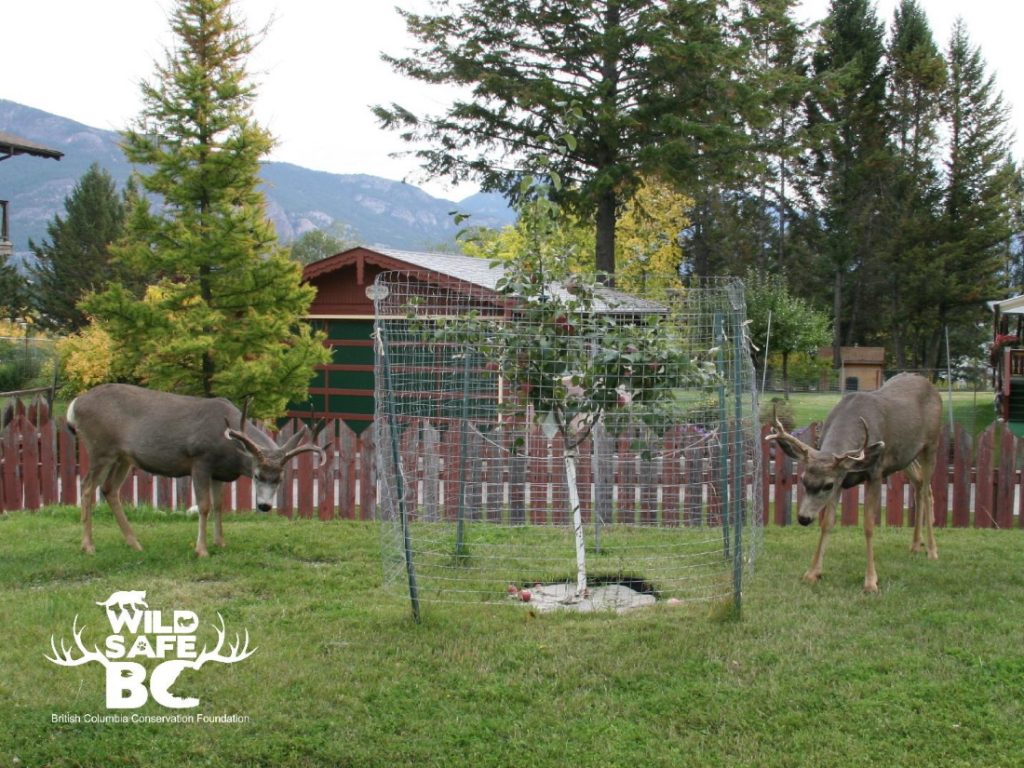Living in Wildlife Country
How we manage our living space has a great deal of influence on the amount of human-wildlife conflict we experience. While wildlife may need to pass through our living space, if we provide food, water, shelter and space, they may linger too long near our homes and this can lead to undesirable consequences both for us and the animals. WildSafeBC recommends that residents walk around their property at least once a year and review how they can reduce providing habitat to potential conflict species.
Remove or Secure Attractants
- Do not store garbage or other organic waste outdoors. If you have curbside collection, only put the containers out on the morning of collection day – never the night before. Make sure recyclables have been cleaned.
- Protect fruit trees with electric fencing or pick fruit early and do not let windfall accumulate. Ensure your compost is well-managed and refer to Growing in Wildlife Country
- Avoid feeding birds when bears are most active (April to November) and ensure birdfeeders are always inaccessible to non-target species such as bears, deer, squirrels and raccoons. Do not let seed accumulate that may attract rats and other rodents.
- Feed pets indoors and keep pets inside at night.
- Keep your barbecue clean by burning off uncooked food and emptying the grease container.
Manage Your Landscaping
Wildlife often use landscaping for shelter and security cover when travelling. While attracting beneficial insects and providing habitat for birds is desirable, avoid providing food and shelter to potential conflict species by:
- Limiting or omitting the use of fruit-bearing plants that may be highly attractive to bears, raccoons, and even coyotes. If you must have fruit-bearing plants, ensure they are not located near building entrances and windows.
- Avoid nut-producing trees that can be highly attractive to bears.
- Trim trees and shrubs so as to remove branches that could provide security cover close to the ground.
- Design your yard with clear sight lines and avoid creating blind-spots that allow wildlife to hide.
- Remove tree limbs that are adjacent to your home that would provide access to your home by raccoons, rats or squirrels.
- Avoid using herbicides that are harmful to wildlife or local pets.
- Do consider native plants that are best adapted to your local growing conditions and will be beneficial to local pollinators.
- Consider fencing, both physical and electric, to prevent access by wildlife.
Fencing

The type of fence you construct will be depend on what attractant you are securing and what animal you are trying to exclude. Many animals are adept climbers but they can be dissuaded from going over the top of a fence if there are energized wires strung along the top. Cougars are able to jump over fences and bears are powerful animals that may either dig under a fence or damage it. Rodents, with their sharp teeth, can chew their way through thin-gauge metal fences. Here are some general guidelines for fencing around the home:
- Solid fencing can help deter animals from seeing potential attractants in your yard. Deer are unlikely to jump a solid fence if they cannot see where they will land.
- Use electric fencing to protect backyard fruit trees, chickens, beehives and gardens from bears.
- Bury fencing below grade to prevent animals from digging under.
- When using fencing, consider how animals will be moving through your community.
- Be sure to check with local bylaws before installing a fence.
Material Storage
Small animals will take advantage of small nooks to find shelter. Firewood, lumber and other materials should be at least 15 cm off the ground. Sheds without flooring may allow animals to access from underneath.
Exclusion from Your Home
Small animals may seek shelter in or under your home if you provide an entrance. Bats will seek maternal roosts in summer to raise their young. They may access an attic or other space through a dime-sized hole. Mice can enter through a quarter inch opening and rats need at least a half inch. As the weather begins to cool in the fall, rodents may enter your garage through doors left open. When bears are active in your community, be mindful of leaving doors and windows ajar, especially at ground level. In the spring, breeding skunks and raccoons may seek shelter under a porch or deck to raise their young.
Block off access to your home by using metal sheeting or heavy wire mesh to exclude your target species. For mice and rats, it is recommended to use quarter inch mesh hardware cloth for larger openings. For small cracks, you can trying using coarse steel wool. By angling the sheet metal out at the top, this will help dissuade small animals from climbing over. To prevent animals from digging underneath, bury the mesh at least 15 cm and for marmots this needs to be increased to 30 cm.


